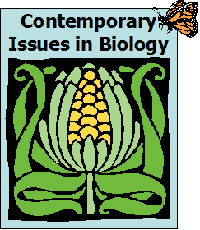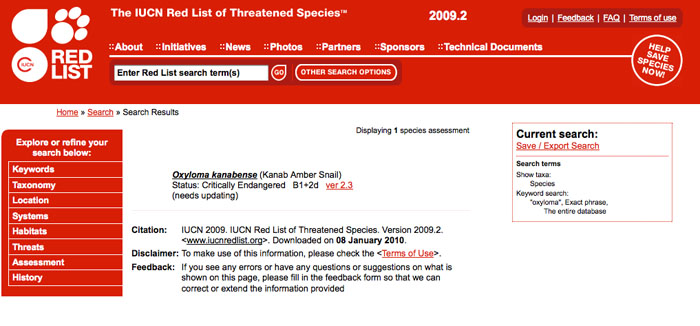
Week 6, Chapter 13 -- Adopt-a-Species
Course home | Weekly schedule | Announcements | Instructor Info | Desire2Learn | MasteringBiology® | Honor Code | FAQs | HELP!
 |
Week 6, Chapter 13 -- Adopt-a-SpeciesCourse home | Weekly schedule | Announcements | Instructor Info | Desire2Learn | MasteringBiology® | Honor Code | FAQs | HELP! |
In this assignment, you will "adopt" an endangered or threatened species. Be sure to choose a species that interests you, because you will write about it periodically throughout this semester. This week, you will select your species and introduce it to the world by writing the script for a mini-"documentary." As you will see, the documentary should integrate some of the information you learned when you studied chapters 5 and 13.
Visit the following websites that list endangered and threatened species in Oklahoma, the U.S., and worldwide:
The U.S. Fish and Wildlife Service site allows you to search by species' common or scientific name, by state, or by county in the "Find Endangered Species" box. Let's say you search for Lichen. Here are the results:

The IUCN Red List site is searchable. Let's say you were interested in the Kanab Amber Snail. You could search for Oxyloma (its genus) by typing it into the search box at the top of the page. The site returns a screen like this:

If you click on the scientific name, you find information about its taxonomy and habitat, and some of the reasons the species is threatened.
You do not, however, have to know the scientific name of a species to use the Red List. You can also search for common names. The Red List will return a wealth of information on your species and/or related ones (note that some may NOT be threatened or endangered in the list).
Using the sites described above, select a threatened or endangered species that you will "adopt" for the rest of the semester. (You will write about this species in several subsequent assignments). Before you commit to a species, it would be a good idea to do a quick web search to make sure there is a reasonable amount of information available on its range, life history, and ecology. You might also want to check out this semester's other Adopt-a-Species assignments in advance (Weeks 8, 12, and 15), so that you'll know the kinds of ideas for your species that you'll have to think of later on.
Although the vertebrates are tempting, and you can choose whatever threatened or endangered organism you like, please seriously consider choosing an invertebrate or plant! We could all stand to learn more about these less glamorous, but still vitally important, organisms. As an extra incentive, you can earn 2 extra credit points if you adopt a species that is NOT a vertebrate.
Everyone in the class must choose a different species. Therefore, while making your selection, go to this week's D2L discussion board, click on the forum/topic "Taken Species," look at everyone else's picks (because you can't have them!), then post a message there with your species. Make sure your subject line includes both of the following:
Yes, all in the subject line! If it doesn't all fit in the subject line, put as much as you can there, and put the full information in the body of your message. This will be the list of species that are taken and therefore unavailable to the rest of the class.
Write the script for a brief documentary that introduces the world to your adopted species. Your documentary should integrate the following information (in any order):
Please do not include random information about your species just because the information is out there. You are more than welcome to include other information about your species, of course, but make sure it's interesting and integrated into the flow of your documentary. You don't want your documentary to sound like someone is just reading an encyclopedia entry to you!
You can see a sample documentary here.
The information you need to complete this assignment might be on the U.S. Fish and Wildlife Service website and/or the Red List website. If not, try doing a Google search on your species' scientific name, and you should get all the information you need. Remember, cutting and pasting from another website, without quotes or citation, is PLAGIARISM -- so is using a cut-and-pasted passage and just changing a few words. Plagiarism is a serious form of academic misconduct. If you have any questions about whether your work constitutes plagiarism, please visit the resources at week 1's plagiarism assignment, or ask your instructor.
For full credit, your documentary must meet the following criteria:
Post your documentary to your personal D2L Discussions forum, and click the "Save" button.
Because you're posting all your Adopt-a-Species assignments to the same forum, please include the words "Week 6" in the title of your post for this assignment. No matter what, always save a back-up copy of your assignment somewhere on your computer! Although you will save/post directly in D2L, you don't want to run the risk that it won't be there when you come back to access it.
Check out this page for more on the topic of good and bad responses. To help you do this, please answer the following questions:
After you have responded to two other students, complete the Gradebook Declaration for this week's Adopt-a-Species assignment in D2L Declarations. (Your Gradebook Declaration is subject to the Honor Code.) You will self-report your responses to other students' posts, but I will grade your entry myself, according to the rubric posted below.
Here is the text of the Desire2Learn Gradebook Declaration: (2 points) I have responded constructively to the posts of at least two other students (1 point per response; 50-100 words for each). |
Grading Rubric for Week 6, Chapter 13 Adopt-a-Species assignment:
I will use the following rubric to grade your Adopt-a-Species assignments. Notice that the rubric does not heavily reward creativity; I am much more interested in looking for evidence that you fulfill the assignment criteria.
| Standards |
|||
| Criteria |
Full credit |
Half credit |
No credit |
| Includes both scientific and common names, correctly written | Yes (both) = 1 point |
Only scientific or only common name, not both =
0.5 point |
No = 0 points |
| Includes picture (or working hyperlink) of organism and cites source of picture | Yes (both) = 1 point |
Picture only, no source = 0.5 point |
No = 0 points |
| Includes domain & kingdom | Yes, both = 1 point |
Only one, not the other = 0.5 point |
No = 0 points |
| Mentions the type of organism (mammal, bird, reptile, amphibian, fish, clam, snail, insect, arachnid, crustacean, flowering plant, conifer/cycad, fern/fern ally, lichen, or other) | Yes = 1 point |
No = 0 points |
|
| Mentions habitat (terrestrial, freshwater, marine) | Yes = 1 point |
No = 0 points |
|
| Mentions where the species lives (continent, country, region, etc.)? | Yes = 1 point |
No = 0 points |
|
| Mentions how it obtains its food (photosynthesis, eating other organisms, etc.) | Yes = 1 point |
No = 0 points |
|
| Mentions at least one property that might make it useful to a bioprospector. | Yes, with explanation = 2 points |
Yes, but without explanation = 1 point |
No = 0 points |
| Describes at least one specific way it may be affected by global climate change | Yes = 2 points |
Yes, but information is not specific or is not related to other information presented in the assignment = 1 point |
No = 0 points |
| Describes the species' threatened or endangered status | Yes = 1 point |
No = 0 points |
|
| All references cited correctly, including author, title, date, functioning hyperlink, and download date | Yes, without exception = 1 point |
Yes, but not always = 0.5 point |
No = 0 points |
Please note that points will be deducted as follows if you fail to meet the "mechanical" requirements of the assignment: